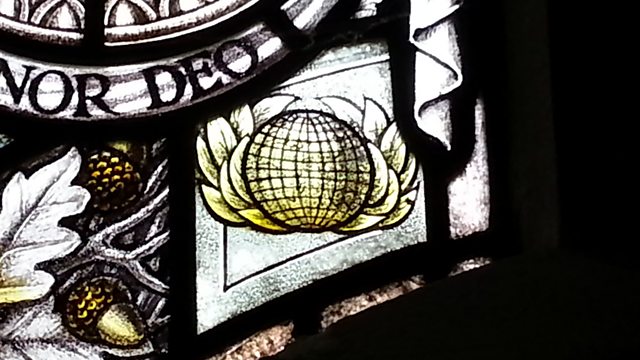Chitterne, Wiltshire: Jutland Hero
An investigation into WW1 soldiers reveals the heroic death of William James Feltham
Lieutenant Colonel Gareth Davies has lived in Chitterne since 2001. He says itβs a quiet village, whose peaceful existence is only punctuated β dramatically - now and then by army training on the nearby ranges of Salisbury Plain.
But in 2010, Gareth says he realised his personal act of remembrance was incomplete; quite fundamentally.
βI realised that, although Iβd stood by the war memorial in Chitterne, I had no idea whose names were on there, how many names were on there or anything about them. So I decided to look into it.β
Garethβs subsequent research revealed a wide diversity of service in those Chitterne men who fought and died.
βI found out that on the memorial, there are seven names. Although they were ordinary men, each of them has a story to tellβ, said Gareth.
The memorial that prompted Garethβs curiosity stands in the graveyard of All Saints with St Maryβs.
However, for a small village in landlocked Wiltshire, one of the seven names has an unexpected connection to the best known sea battle of World War One.
βThe name at the top of the list, and the first person to die in the Great War, is Private William James Feltham of the Royal Marine Light Infantry. He died on 31 May 1916 although, rather erroneously, the war memorial says he died on the 31 March 1916.β
The date is significant, according to Gareth, because thatβs when the Royal Navyβs Grand Fleet clashed with its arch rival, the German High Seas Fleet.
The battle of Jutland was fought over 31 May β 1 June, 1916.
Working in the evenings, and weekends, Garethβs research tells us how a 42-year-old from Wiltshire came to die in the cold waters of the North Sea.
William James Feltham was born in Chitterne and, perhaps spurred on by his grandfather, Isaac, who ran a marine store in the village, joined the Colours in 1893.
Gareth discovered that William had a number of trades in his chosen service, the Royal Marine Light Infantry, training as a butcher. At the time of the battle of Jutland, Williamβs primary role was as a naval gunner aboard one of the Royal Navyβs battlecruisers, HMS Indefatigable.
βI donβt know Williamβs exact place in the ship; whether he was in the turret, loading the guns, or in the magazine, sending the huge shells up from deep within the ship but I do know the conditions would have been hot, noisy and crampedβ said Gareth.
As an army officer serving the Royal Tank Regiment, Gareth feels empathy for anyone serving in such confined conditions: βThe smell of cordite would have been everywhere, and cordite β the propellant which flung the huge naval shells over very long distances β is one of those things that just seep into all your pores.β
Those are the conditions that William would have been working under when, around 4pm on 31 May, shells from the German ship, Von der Tann, hit HMS Indefatigable.
Her magazines, where her explosive ammunition was stored, were hit, resulting in a huge explosion.
βHMS Indefatigable was not only ripped apart but blown apart, some 200ft in the air. Of the 1,017 men serving on the Indefatigable, only two survived. Iβve heard anecdotally, that those two men only survived because they were spotters, high up in the crowβs nests and so were blown clear during the explosion. William James wouldnβt have felt a thingβ said Gareth.
The battle lasted into the next day but proved inconclusive with both sides claiming victory.
William James, and his six other Chitterne comrades, are also commemorated by a plaque and stained glass window inside the church.
Gareth said that he feels a greater connection with the seven men, William James among them, who left Chitterne never to return: βI know considerably more than I did. I know about their family life, I know about their life here in Chitterne, and I know about their military service β and sadly, I know about their deaths. Whilst it is satisfying, in a way, finding out about people, the reason Iβve investigated them is that they gave their lives during the Great War.β
Gareth says that during the centenary years of their deaths, the people of Chitterne plan to honour each of the seven. That means on 31 May 2016, the villagers will remember William James Feltham, who died in the biggest naval battle of World War One.
Location: Church of all saints, Chitterne, Wiltshire BA12 0LL
Photograph of the commemorative stained glass window and brass plaque inside the church
Presented by Colonel Gareth Davies who lives in Chitterne
Duration:
Credits
| Role | Contributor |
|---|---|
| Presenter | Colonel Gareth Davies |
This clip is from
Featured in...
![]()
ΒιΆΉΤΌΕΔ Wiltshire—World War One At ΒιΆΉΤΌΕΔ
Places in Wiltshire that tell a story of World War One
More clips from World War One At ΒιΆΉΤΌΕΔ
-
![]()
The loss of HMY Iolaire
Duration: 18:52
-
![]()
Scotland, Slamannan and the Argylls
Duration: 07:55
-
![]()
Scotland Museum of Edinburgh mourning dress
Duration: 06:17
-
![]()
Scotland Montrose 'GI Brides'
Duration: 06:41







